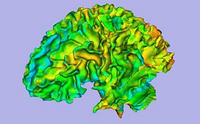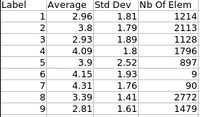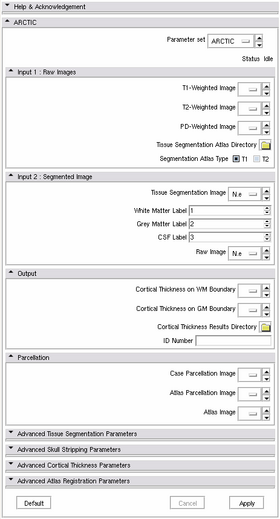Difference between revisions of "Modules:ARCTIC-Documentation-3.6"
| (10 intermediate revisions by the same user not shown) | |||
| Line 20: | Line 20: | ||
Type: CLI | Type: CLI | ||
| − | Category: | + | Category: Workflow |
===Authors, Collaborators & Contact=== | ===Authors, Collaborators & Contact=== | ||
| Line 45: | Line 45: | ||
* Tutorial Dataset | * Tutorial Dataset | ||
** [http://www.nitrc.org/frs/download.php/545/ARCTIC_Tutorial_example_1.0.zip Download Example dataset] | ** [http://www.nitrc.org/frs/download.php/545/ARCTIC_Tutorial_example_1.0.zip Download Example dataset] | ||
| + | * [http://www.nitrc.org/plugins/mwiki/index.php/arctic:MainPage Wiki page on NITRC] | ||
===Quick Tour of Features and Use=== | ===Quick Tour of Features and Use=== | ||
| − | |||
| − | |||
{| | {| | ||
| | | | ||
| − | * '''Input 1 | + | [[Image:ARCTIC.png|thumb|280px|ARCTIC User Interface]] |
| − | ** T1-weighted image: set input T1 image | + | * '''Inputs''': Two modes exist to select input images needed to perform the cortical thickness analysis |
| − | ** T2-weighted image: set input T2 image, if available | + | ** '''Input mode 1 - Raw Images:''' set input images representing the different modalities of the same subject |
| − | ** PD-weighted image: set input PD image, if available | + | *** ''T1-weighted image:'' set input T1 image, if available |
| − | ** Tissue segmentation atlas directory: set directory containing gray-scale atlas to perform the tissue segmentation | + | *** ''T2-weighted image:'' set input T2 image, if available |
| − | ** Segmentation atlas type (T1 or T2, default: T1): set atlas type | + | *** ''PD-weighted image:'' set input PD image, if available |
| − | * '''Input 2 | + | *** ''Tissue segmentation atlas directory:'' set directory containing gray-scale atlas to perform the tissue segmentation |
| − | ** Tissue segmentation image: set tissue segmentation label image | + | *** ''Segmentation atlas type (T1 or T2, default: T1):'' set segmentation atlas type (should match subject input image) |
| − | ** White matter label (default: 1): set tissue segmentation white matter label | + | ** '''Input mode 2 - Segmented Images:''' set tissue segmentation label image with its related raw image |
| − | ** Gray matter label (default: 2): set tissue segmentation gray matter label | + | *** ''Tissue segmentation image:'' set tissue segmentation label image |
| − | ** CSF label (default: 3): set tissue segmentation CSF label | + | *** ''White matter label (default: 1):'' set tissue segmentation white matter label |
| − | ** Raw image: set its related raw image (needed to perform | + | *** ''Gray matter label (default: 2):'' set tissue segmentation gray matter label |
| + | *** ''CSF label (default: 3):'' set tissue segmentation CSF label | ||
| + | *** ''Raw image:'' set its related raw image (needed to perform a lobar analysis, i.e to perform the atlas warping) | ||
| + | |||
| + | |||
* '''Output:''' | * '''Output:''' | ||
| − | ** Cortical thickness on white matter boundary: set output image which represents cortical thickness measurement on the white matter boundary | + | ** ''Cortical thickness on white matter boundary:'' set output image which represents cortical thickness measurement on the white matter boundary |
| − | ** Cortical thickness on gray matter boundary: set output image which represents cortical thickness measurement on the gray matter boundary | + | ** ''Cortical thickness on gray matter boundary:'' set output image which represents cortical thickness measurement on the gray matter boundary |
| − | ** Cortical thickness results directory: set output directory to save cortical thickness measurements | + | ** ''Cortical thickness results directory:'' set output directory to save cortical thickness measurements |
| − | ** ID number: set ID number to set prefix of output images | + | ** ''ID number:'' set ID number to set prefix of the output images |
| − | * '''Parcellation:''' | + | |
| − | ** | + | |
| − | *** Case parcellation image: set the parcellation image defined in the | + | * '''Parcellation:''' set parameters to perform a lobar analysis |
| − | ** | + | ** If a parcellation is already defined for the subject: |
| − | *** Atlas parcellation image: set the atlas parcellation image | + | *** ''Case parcellation image:'' set the parcellation image defined in the subject space coordinate |
| − | *** Atlas image: set the grayscale atlas image | + | ** If a parcellation needs to be defined (i.e atlas registration will be performed): |
| − | + | *** ''Atlas parcellation image:'' set the atlas parcellation image | |
| + | *** ''Atlas image:'' set the grayscale atlas image | ||
| + | |||
| + | |||
| + | [[Image:ARCTIC_AdvancedParams.png|thumb|280px|ARCTIC Advanced Parameters User Interface]] | ||
* '''Advanced tissue segmentation parameters''' | * '''Advanced tissue segmentation parameters''' | ||
| + | ** ''Filter options:'' specifies smoothing parameters prior to the segmentation | ||
| + | ** ''Priors:'' set prior weights for priors defined in the atlas directory. Prior weights can be adjusted globally (e.g., if one class overwhelms the other it can be set a lower weight) through comma separated numbers. | ||
| + | ** ''Maximum bias degree:'' set bias correction polynomial degree to adjust the severity of the bias field in the image. Bias field correction can be disabled by setting it to zero. | ||
| + | ** ''Atlas warping parameters:'' enable/disable B-spline warping and set grid size per direction (number of control points). | ||
| + | |||
| + | |||
* '''Advanced skull-stripping parameters''' | * '''Advanced skull-stripping parameters''' | ||
| − | * '''Advanced registration parameters:''' | + | ** ''Mask dilation (default: disabled):'' check button to slightly dilate the mask. Useful if the tissue segmentation doesn't perfectly mask the brain. |
| − | + | ||
| + | |||
| + | * '''Advanced cortical thickness parameters:''' | ||
| + | ** ''InterpOff (default: disabled):'' check button to gather interpolated cortical thickness measurements in two additionnal csv files. The method computes sparse measurement by default. | ||
| + | ** ''Threshold (default: 1.8):'' set distance threshold (in mm) used to match the cortical thickness map with the parcellation | ||
| + | |||
| + | |||
| + | * '''Advanced atlas registration parameters:''' | ||
| + | ** ''Initialization:'' choose between different initialization methods (see registration pipeline discussion) | ||
| + | |||
|} | |} | ||
| Line 93: | Line 115: | ||
** [[Modules:RegisterImages-Documentation-3.6|Register Images]] | ** [[Modules:RegisterImages-Documentation-3.6|Register Images]] | ||
** [[Modules:ResampleScalarVectorDWIVolume-Documentation-3.6|ResampleScalarVectorDWIVolume]] | ** [[Modules:ResampleScalarVectorDWIVolume-Documentation-3.6|ResampleScalarVectorDWIVolume]] | ||
| − | * Publicly available atlases: | + | * Publicly available atlases on MIDAS: |
** [http://www.insight-journal.org/midas/item/view/2277 Pediatric atlas] | ** [http://www.insight-journal.org/midas/item/view/2277 Pediatric atlas] | ||
** [http://www.insight-journal.org/midas/item/view/2328 Adult atlas] | ** [http://www.insight-journal.org/midas/item/view/2328 Adult atlas] | ||
| Line 101: | Line 123: | ||
===Tests=== | ===Tests=== | ||
| − | On the [http:// | + | On the [http://skylla.ia.unc.edu/CDash/index.php?project=ARCTIC Dashboard], these tests verify that the module is working on various platforms: |
* MyModuleTest1 [http://viewvc.slicer.org/viewcvs.cgi/trunk MyModuleTest1.cxx] | * MyModuleTest1 [http://viewvc.slicer.org/viewcvs.cgi/trunk MyModuleTest1.cxx] | ||
| Line 116: | Line 138: | ||
===Source code & documentation=== | ===Source code & documentation=== | ||
| − | Download release source code via svn: | + | * [https://www.ia.unc.edu/NeuroLib/Release/ARCTIC/ Source code] |
| − | * svn co https://skylla.ia.unc.edu/NeuroLib/Release/ARCTIC | + | * Download release source code via svn: |
| + | ** svn co https://skylla.ia.unc.edu/NeuroLib/Release/ARCTIC | ||
== More Information == | == More Information == | ||
| Line 125: | Line 148: | ||
===References=== | ===References=== | ||
| − | + | ||
| + | * H.C. Hazlett, C. Vachet, C. Mathieu, M. Styner, J. Piven, Use of the Slicer3 Toolkit to Produce Regional Cortical Thickness Measurement of Pediatric MRI Data, presented at the 8th Annual International Meeting for Autism Research (IMFAR) Chicago, IL 2009. | ||
| + | * C. Mathieu, C. Vachet, H.C. Hazlett, G. Geric, J. Piven, and M. Styner, ARCTIC – Automatic Regional Cortical ThICkness Tool, UNC Radiology Research Day 2009 abstract | ||
Latest revision as of 20:06, 26 August 2010
Home < Modules:ARCTIC-Documentation-3.6Return to Slicer 3.6 Documentation
ARCTIC: Automatic Regional Cortical ThICkness
General Information
Module Type & Category
Type: CLI
Category: Workflow
Authors, Collaborators & Contact
- Author1: Cedric Mathieu, UNC-Chapel Hill
- Contributor1: Clement Vachet, UNC-Chapel Hill
- Contributor2: Martin Styner, UNC-Chapel Hill
- Contributor3: Heather Cody Hazlett, UNC-Chapel Hill
- Contact: Clement Vachet, cvachet[at]email[dot]unc[dot]edu
Module Description
ARCTIC (Automatic Regional Cortical ThICkness) is an end-to-end application developped at UNC-Chapel Hill allowing individual analysis of cortical thickness. This cross-platform tool can be run within Slicer3 as an external module, or directly as a command line.
Usage
Use Cases, Examples
This module is especially appropriate when one wants to perform individual regional cortical thickness analysis. ARCTIC allows efficient QC via precomputed 3D-Slicer scenes.
Tutorials
- Tutorials:
- Tutorial Dataset
- Wiki page on NITRC
Quick Tour of Features and Use
|
Development
Notes from the Developer(s)
Algorithms used, library classes depended upon, use cases, etc.
Dependencies
- Slicer3 modules:
- Publicly available atlases on MIDAS:
Tests
On the Dashboard, these tests verify that the module is working on various platforms:
- MyModuleTest1 MyModuleTest1.cxx
- MyModuleTest2 MyModuleTest2.cxx
Known bugs
Links to known bugs in the Slicer3 bug tracker
Usability issues
Follow this link to the Slicer3 bug tracker. Please select the usability issue category when browsing or contributing.
Source code & documentation
- Source code
- Download release source code via svn:
More Information
Acknowledgment
This work is part of the National Alliance for Medical Image Computing (NAMIC), funded by the National Institutes of Health through the NIH Roadmap for Medical Research, Grant U54 EB005149. Information on the National Centers for Biomedical Computing can be obtained from http://nihroadmap.nih.gov/bioinformatics
References
- H.C. Hazlett, C. Vachet, C. Mathieu, M. Styner, J. Piven, Use of the Slicer3 Toolkit to Produce Regional Cortical Thickness Measurement of Pediatric MRI Data, presented at the 8th Annual International Meeting for Autism Research (IMFAR) Chicago, IL 2009.
- C. Mathieu, C. Vachet, H.C. Hazlett, G. Geric, J. Piven, and M. Styner, ARCTIC – Automatic Regional Cortical ThICkness Tool, UNC Radiology Research Day 2009 abstract






